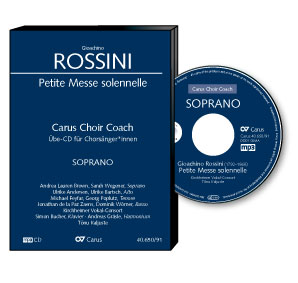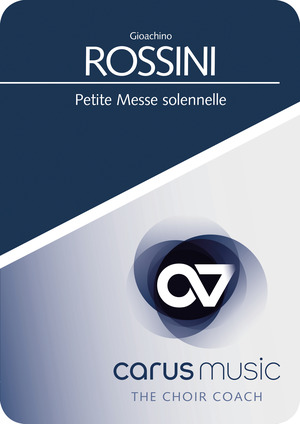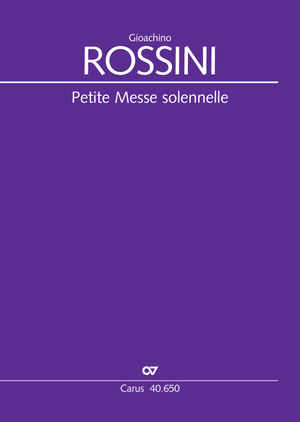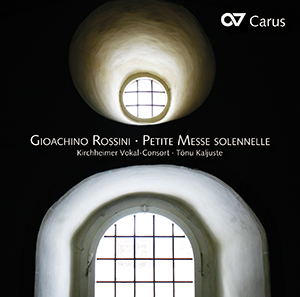
On the surface, the Petite Messe solennelle is an occasional work, written for the dedication of the private chapel of a well-to-do Parisian nobleman. Rossini himself never published the work. The typically Rossinian rhythms and capricious drama, entirely in operatic style, offer a choir the chance to show off its full range of abilities – provided it has mastered the challenges.
The Carus Choir Coach offers choir singers the unique opportunity to study and learn their own, individual choral parts within the context of the sound of the entire choir and orchestra. For every vocal range a separate Audio CD or MP3 and download containing each choir part is available. The Carus Choir Coach is based on recorded interpretations by renowned artists who have performed the work from carefully prepared Carus Urtext editions. Each choir part is presented in three different versions:
- Original recording
- Coach: each part is accompanied by the piano, with the original recording sounding in the background
- Coach in slow mode: the tempo of the coach slows down to 70% of the original version – through this reduction passages can be learned more effectively.
Performers: Andrea Lauren Brown, Sarah Wegener (soprano), Ulrike Andersen, Ulrike Bartsch (alto), Michael Feyfar, Georg Poplutz (tenore), Jonathan de la Paz Zaens, Dominik Wörner (basso) – Kirchheimer Vokal-Consort, Simon Bucher (Klavier), Andreas Gräsle (Harmonium) – Tõnu Kaljuste
Contents
-
Composer
Gioachino Rossini
| 1792-1868
-
Ensemble
Kirchheimer Vokal-Consort
The Kirchheimer Vokal-Consort t akes i ts name from the idyllic wine village of Kirchheim an der Weinstrasse in Rhineland-Palatinate. At the invitation of Dominik Wörner, ten musicians came together at the 2010 “Kirchheimer Konzertwinter” Festival to perform the Petite messe solennelle by Gioachino Rossini. All members of the double quartet are prizewinning soloists (ARD International Music Competition in Munich, Leipzig Bach Competition, etc.) and enjoy international opera and concert careers. At the same time, they have extensive experience performing in leading ensembles (Collegium Vocale Gent, Bach Collegium Japan, Sette Voci, Cantus Cölln, RIAS Kammerchor). Drawing on this background, the KVC has acquired an enviable reputation within a very short time. Its distinctive unmistakable sound, combining the best of solo and ensemble singing, has been much praised. They are accompanied by two equally distinguished instrumentalists. From the beginning the high artistic potential has enthused Tõnu Kaljuste, the director. Following concerts under his direction, it was decided to make a CD of their interpretation. In the Noblessner Hall in the port of Tallinn, Estonia, designed by Ludvig Nobel in 1913 (the nephew of the founder of the Nobel Prize), the group found a fascinating place with an ideal acoustic in which to realize their project. During the Soviet period the building was used as a submarine factory. Pleading for peace, singing “Dona nobis pacem” in a former armaments production plant, has a strong symbolic power here. Personal details
-
Conductor
Tonu Kaljuste
For twenty years Tõnu Kaljuste (conductor) was artistic director and principal conductor of the Estonian Philharmonic Chamber Choir, which he founded in 1981, and the Tallinn Chamber Orchestra. Kaljuste has also been chief conductor of the Swedish Radio Choir and the Netherlands Chamber Choir. He has directed international choral seminars and workshops for several years and has worked as a guest conductor with leading orchestras and choirs throughout Europe, Australia and America. As well as immersing himself in the music of the great northern and eastern European moderns, such as Schnittke, Kurtag, Penderecki, Rautavaara and Kancheli, he has a deep affinity with the composers of his native Estonia, including Pärt, Tüür, Tormis and Eller. He has established an international reputation with his wide-ranging repertoire from opera, via the traditional symphonic repertoire to contemporary music. His numerous recordings have won many awards and have been nominated for Grammy awards. In 1999 he received the Cannes Classical Award in the category “Best 20th Century Choral Music” for his recording of Alfred Schnittke’s Psalms of Repentance. In 2004 he was awarded first prize by the Estonian State Foundation “Kultuurkapital.” The same year he became artistic director of the Nargen Festival, an annual, three-month long musical event on the coast of Estonia. He is a member of the Royal Swedish Academy of Music. Personal details
-
Soloist - soprano
Sarah Wegener
-
Soloist - soprano
Andrea Lauren Brown
Whether Baroque or contemporary music, Lieder or opera, the soprano Andrea Lauren Brown is equally convincing through the brilliant lightness of her interpretations. She made her operatic debut at the age of seventeen in Libby Larsen’s A Wrinkle in Time. This was followed by studies at West Chester University, Pennsylvania, Westminster Choir College in Princeton, New Jersey and at the Mozarteum in Salzburg. Winner of numerous prizes, in Europe she has given guest performances at the Theater an der Wien, the Festspielhaus Baden-Baden, at the Schwetzingen and Ludwigsburg Festivals, Spoleto Festival and Schumann Festival in Düsseldorf. Personal details
-
Soloist - alto
Ulrike Andersen
-
Soloist - alto
Ulrike Bartsch
-
Soloist - tenor
Georg Poplutz
-
Soloist - tenor
Michael Feyfar
Michael Feyfar received his first singing training in the Knabenkantorei Basel. He studied in Bern, Karls ruhe (D. Litaker) and at the Schola Cantorum Basiliensis (G. Türk). Michael Feyfar’s repertoire encompasses music from early baroque to contemporary and includes Lieder, oratorio and opera. Thus, he recently performed the Winterreise as well as Janacek’s Zápisníník zmizelého (The Diary of one who disappeared), recorded by the SWR. He is in great demand as Evangelist in Bach’s passions and regularly performs in free opera productions, such as Orphée in Gluck’s Orphée et Euridice (Baroque Opera Schloss Waldegg), in G. F. Haas’s chamber opera Das Schwarz (Lucerne Festival) as well as in other roles, e. g., as ?ekalinskij in Pique Dame at the Basel Theater. Personal details
-
Soloist - bass
Dominik Wörner
-
Soloist - bass
Jonathan de la Paz Zaens
-
Soloist - piano
Simon Bucher
Simon Bucher (piano) was b orn in Switzerland, and is much in demand as a soloist, song accompanist, chamber musician, improviser and teacher. After studying at the Hochschule der Künste Bern with Erika Radermacher and Tomasz Herbut, he took his teaching and performance diplomas and attended masterclasses in lieder interpretation with Irwin Gage at the Hochschule für Musik und Theater in Zürich with distinction. He was also much influenced by Dalton Baldwin and Ruben Lifschitz. Bucher is a prizewinner of the Swiss Musicians Association and the 10th International Johannes Brahms Competition Pörtschach, Austria, in 2003. He has given guest performances at leading festivals including the Ruhr Piano Festival and RheinVokal. Numerous CD recordings illustrate this versatile artist’s achievements. He is artistic director of the “Liederstunden Bern” series. Personal details
-
Soloist - organ
Andreas Gräsle
| 1964Andreas Gräsle (harmonium) studied church music in Stuttgart (organ: Jon Laukvik) and took his concert diploma in organ with Daniel Roth in Saarbrücken, followed by early music studies with Andrea Marcon. He was a scholarship holder of the German Academic Exchange Service (DAAD), and a prizewinner at the International Johann Pachelbel Competition in Nuremberg in 1991. From 1996 to 2003 he was choirmaster and organist at the Augustinuskirche in Schwäbisch Gmünd, and in April 2003 he became district choirmaster in Ditzingen. In addition, he is much in demand as chamber music partner, organist and harpsichordist. He has made several CDs of organ and chamber music, and his own improvisations and arrangements of children’s songs round off his musical activities. He has taught score reading at the Musikhochschule Stuttgart since 1997. Personal details
Frequent questions about this work
 There are no questions and answers available so far or you were unable to find an answer to your specific question about this work? Then click here and send your specific questions to our Customer Services!
There are no questions and answers available so far or you were unable to find an answer to your specific question about this work? Then click here and send your specific questions to our Customer Services!










